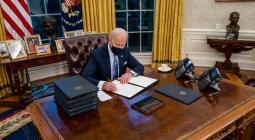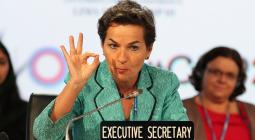Reentering The Paris Agreement: Choose Efficiency.

There’s something about Paris.
There’s something about Paris. Withdrawing the United States from the landmark international climate accord was one of President Donald Trump’s first actions when he assumed office in 2017. And President-elect Joe Biden has now announced the U.S will be rejoining the agreement.
The Paris Agreement calls on nations to limit the rise of global average temperatures in this century to 2 degrees Celsius above preindustrial levels – while pursuing means to limit the increase to 1.5 degrees – through reducing greenhouse gas (GHG) emissions.
Five years after its ratification by most countries on this earth, our global community is still nowhere near where we need to be to achieve this goal. Global emissions continue to steadily rise – despite temporary reductions last year due to COVID-19
What’s frustrating is that, despite the fact that efficiency can deliver 40% of the energy-related emission reductions needed, global implementation of energy-efficiency policies remains sluggish.
This presents an enormous opportunity and imperative for the Biden administration. The U.S. will need to put in place a nationally determined contribution (NDC) – the specific set of actions outlined to reduce its emissions – upon rejoining the accord. The Biden administration must ensure that efficiency is a key element of the U.S.’ NDC.
Here are actions that the Biden administration can take to uphold its commitment:
1. Scale up collaboration. Collaboration is paramount to coordinating the deployment of capital, technologies, and efficiency expertise to countries. Public and private sector collaboration can scale up efficiency efforts and unlock private investment, relieving governments from shouldering the entire financial burden. To signal its willingness to deepen collaboration and coordinate action across geographies, the Biden administration should join the Three Percent Club, a coalition of countries, companies, and organizations with a mission to achieve a 3% rate of annual improvement in energy efficiency. Targeted action by Three Percent Club partners will catalyze increases in cost-effective energy efficiency investments – with the ultimate goal of reaching around $600 billion USD per year of new investment by 2025. This is the level of investment identified in the IEA’s Efficient World Scenario (from the $240 billion baseline investment in 2019) as necessary to achieve the Paris goals.
2. Tighten fuel economy standards and encourage the transition to electric vehicles (EVs). Since transportation is the largest contributor to U.S. emissions, it is critical that the U.S. NDC addresses transportation efficiency. Within the first 100 days of his presidency, Biden can return to a more rigorous fuel economy standard schedule. In addition, the administration can advance electrification by using federal procurement powers to encourage agencies to purchase electric and hybrid models as older vehicles are retired. It can work with Congress to pass an infrastructure package that addresses barriers to EV ownership, including through EV tax credits; this will help drive the market toward EVs, which are over twice as efficient as conventionally fueled vehicles.
3. Work to reduce building emissions. Biden should also plan to address buildings in his climate plans, as they currently account for about 40% of U.S. energy consumption. Through executive action, the Biden administration can re-establish stringent energy and water savings targets, and coordinate plans and investments across the federal government’s portfolio of nearly 350,000 buildings. The Biden administration can also work with Congress to increase funding to the ENERGY STAR program, which has a successful track record of sharply reducing energy use in buildings. Moreover, he can encourage federal agencies to adopt new-generation technologies in facility design to reap deeper energy savings and lead the way in energy efficiency’s digital transformation, while also doubling down on investments in R&D for further innovation.
Rejoining the Paris Accord at a time when the U.S. economy badly needs a boost may seem counterintuitive. However, investing in efficiency means we do not have to make a choice between climate action and economic recovery. Not only do efficiency investments save Americans billions in energy costs, but they create good, well-paying jobs that will help the country and all its residents get back on their feet.
25 January 2021
Climate Action





